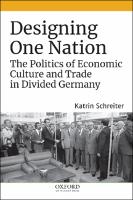Designing One Nation
The Politics of Economic Culture and Trade in Divided Germany, 1945-1990
Author(s)
Schreiter, Katrin
Collection
Sustainable History Monograph Pilot (SHMP)Language
EnglishAbstract
"This is an open access title available under the terms of a CC BY-NC-ND 4.0 International License. It is free to read at Oxford Scholarship Online and offered as a free PDF download from OUP and selected open access locations, thanks to a generous grant from the Andrew W. Mellon Foundation, as part of The Sustainable History Monograph Pilot.The histories of East and West Germany traditionally emphasize the Cold War rivalries between the communist and capitalist nations. Yet, even as the countries diverged in their political directions, they had to create new ways of working together economically. In Designing One Nation, Katrin Schreiter examines the material culture of increasing economic contacts in divided Germany from the 1940s until the 1990s. Trade events, such as fairs and product shows, became one of the few venues for sustained links and knowledge between the two countries after the building of the Berlin Wall. Schreiter uses industrial design, epitomized by the furniture industry, to show how a network of politicians, entrepreneurs, and cultural brokers attempted to nationally re-inscribe their production cultures, define a postwar German identity, and regain economic stability and political influence in postwar Europe. What started as a competition for ideological superiority between East and West Germany quickly turned into a shared, politically legitimizing quest for
an untainted post-fascist modernity. This work follows products from the drawing board into the homes of ordinary Germans to offer insights into how converging visions of German industrial modernity created shared expectations about economic progress and living standards. Schreiter reveals how intra-German and European trade policies drove the creation of products and generated a certain convergence of East and West German taste by the 1980s. Drawing on a wide range of sources from governments, furniture firms, industrial design councils, home lifestyle magazines, and design exhibitions, Designing One Nation argues that an economic culture linked the two Germanies even before reunification in 1990."
Keywords
general & world history; urban economics; political science & theoryDOI
10.1093/0190877308.001.0001Publisher
Oxford University PressPublisher website
https://global.oup.com/Publication date and place
New York, 2020Grantor
Imprint
Oxford University Press USASeries
Oxford Scholarship Online,Classification
European history
Cold wars and proxy conflicts
Regional / urban economics
Decorative arts
Politics and government


 Download
Download Download
Download